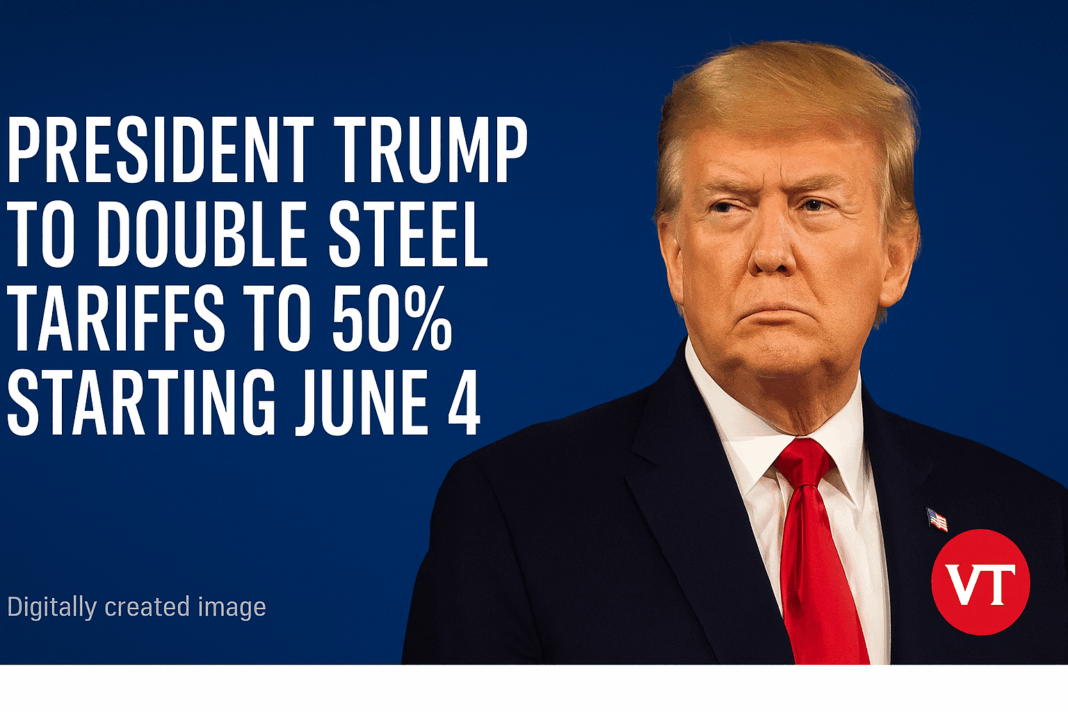Story Highlights
- President Trump announced tariffs on steel and aluminum imports will increase from 25% to 50%.
- The new rate takes effect on Wednesday, June 4.
- The decision follows recent legal battles over the legality of reciprocal tariffs.
- Korean steelmakers report a nearly 19% decline in U.S.-bound exports this March.
President Donald J. Trump announced Friday that the United States will double its tariffs on imported steel, raising the rate from 25% to 50% starting June 4. The decision marks a significant escalation in his administration’s protectionist trade policy and is expected to reverberate across the global steel industry.
Trump: “A BIG Jolt of Great News”
Speaking on X (formerly Twitter), Trump said the increase will further protect American steelmakers. “We’re going to bring it from 25% to 50%—the tariffs on steel into the United States—which will even further secure the steel industry in the United States,” he said.
Later that day, he posted a full statement to Truth Social confirming the move:
“It is my great honor to raise the Tariffs on steel and aluminum from 25% to 50%, effective Wednesday, June 4th. Our steel and aluminum industries are coming back like never before,” Trump wrote. “This will be yet another BIG jolt of great news for our wonderful steel and aluminum workers. MAKE AMERICA GREAT AGAIN!”
Trade Tensions and Legal Pushback
The tariff hike comes just days after the U.S. Court of International Trade ruled that some of Trump’s reciprocal tariffs lacked proper legal backing. However, the U.S. Court of Appeals for the Federal Circuit temporarily blocked that ruling, allowing the tariff program to continue.
Trump first introduced the 25% steel tariffs in March as part of a broader effort to reduce trade deficits and revive American manufacturing. The White House argued that unchecked steel imports, particularly from China and South Korea, threatened national security and industrial capacity.
Impact on Korean Steel Exports
South Korean steelmakers have already reported significant drops in U.S.-bound exports. According to trade data, outbound steel shipments from South Korea to the U.S. totaled $340 million in March, down 18.9% year-on-year. Analysts suggest that tariff uncertainty may have contributed to the decline, even though orders are typically placed months in advance.
Hyundai Steel to Invest $5.8 Billion in U.S.
In a strategic response, Hyundai Steel Co. announced plans to build a $5.8 billion electric arc furnace-based steel mill in Louisiana by 2029. This facility will be the company’s first steel production site in the United States and is seen as a proactive step to reduce tariff exposure by producing steel domestically.
Global Market on Alert
The upcoming tariff increase adds pressure on international steel exporters, especially those in Asia and Europe. Industry experts warn that a prolonged hike could trigger retaliatory measures and disrupt global trade flows.
(By a Virginia Times intern in Washington, D.C.)
A global media for the latest news, entertainment, music fashion, and more.














